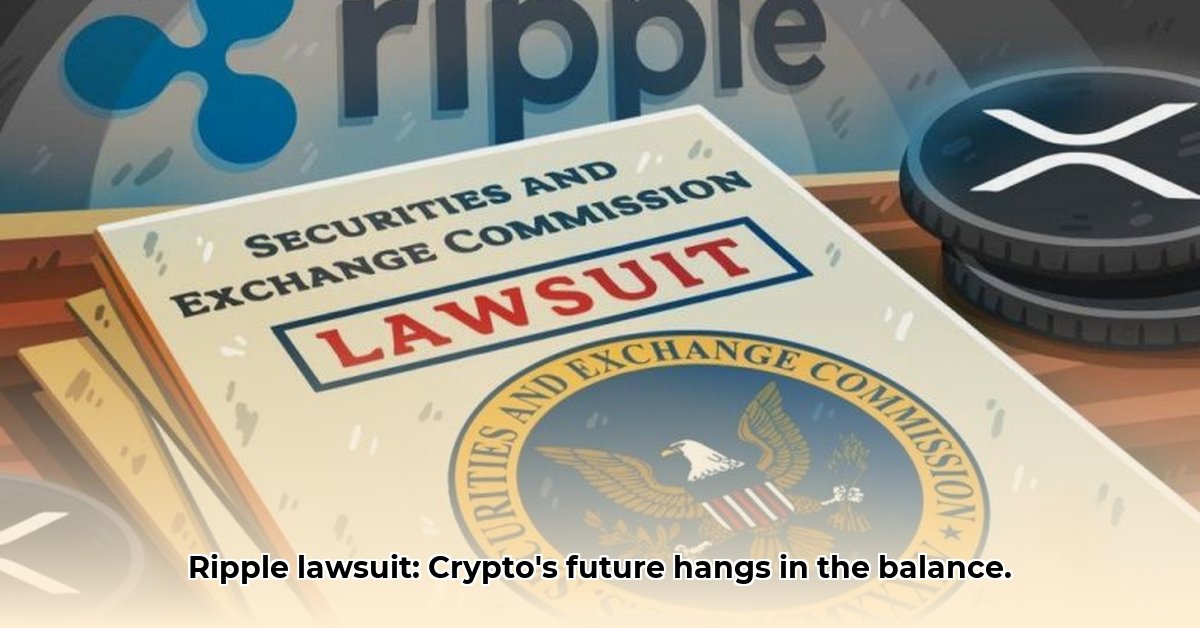
The protracted legal battle between Ripple Labs and the Securities and Exchange Commission (SEC) continues to significantly impact the cryptocurrency market and the future of digital asset regulation. This case, initiated in 2020, challenges the very definition of a "security" in the context of cryptocurrencies, with far-reaching consequences for investors, exchanges, and the industry as a whole.
What's at Stake: Defining "Securities" in the Crypto Age
The core of the dispute revolves around whether XRP, Ripple's cryptocurrency, constitutes an unregistered security. The SEC, applying the Howey Test (a decades-old legal framework used to identify investment contracts), argued that Ripple's sales of XRP met the criteria of a security: an investment of money in a common enterprise with a reasonable expectation of profits derived from the efforts of others. Ripple counters that most XRP sales were not securities transactions, focusing on the distinction between programmatic sales (via exchanges) and direct sales to institutional investors. This distinction is crucial; a finding that XRP is not a security could significantly reshape the regulatory landscape for numerous cryptocurrencies.
The July 2023 court ruling partially favored Ripple, deciding that programmatic XRP sales did not constitute securities offerings, while direct sales to institutional investors did. This created immediate market volatility. However, the SEC's appeal keeps the legal uncertainty alive, and the ultimate outcome will set a major precedent for future crypto regulation. How will this landmark legal decision shape the future regulatory landscape for the dynamic world of cryptocurrencies?
The Ripple Effect: Market Volatility and Investor Sentiment
The legal proceedings have consistently triggered significant market fluctuations. Each court decision, appeal, or hearing generates substantial uncertainty, impacting both XRP's price and the broader crypto market. This uncertainty isn't merely speculative; it directly affects investor confidence and trading activity. Will the legal ambiguity continue to plague the market, or will a clear ruling finally bring stability?
The Latest Update and Future Implications
The partial victory for Ripple, though celebrated by some, is far from a final resolution. Both parties have appealed parts of the ruling, prolonging the legal battle. This ongoing uncertainty creates a challenging environment for all stakeholders. What are the potential consequences of a ruling either way? A decisive win for the SEC might lead to stricter regulation for numerous cryptocurrencies, potentially hindering innovation and market growth. Conversely, a definitive win for Ripple could incentivize a more laissez-faire approach, at least in the short term, possibly leading to more regulatory uncertainty in other jurisdictions.
This prolonged ambiguity highlights the need for clear, comprehensive legislation specifically tailored to the unique characteristics of crypto assets. Will lawmakers respond decisively, or will the crypto industry remain entangled in legal uncertainty?
Actionable Insights for Stakeholders
The Ripple lawsuit’s implications necessitate proactive adaptation by all stakeholders:
For Crypto Exchanges: Strengthen KYC/AML compliance, meticulously monitor legal developments, and diversify asset offerings to mitigate risk. (This increases resilience to regulatory changes).
For Crypto Investors: Prioritize portfolio diversification, conduct thorough due diligence before investing, and remain informed about evolving regulatory frameworks. (This reduces exposure to individual asset risks).
For Crypto Projects: Prioritize transparency, seek expert legal counsel specializing in digital assets, and align business models with evolving regulatory expectations. (This minimizes future legal challenges).
Risks and Opportunities: Navigating the Uncertain Future
The longer-term implications of the Ripple case remain uncertain, posing both short-term and long-term risks. These include sustained market volatility, evolving regulatory landscapes, and the impact on the financial health of projects. However, navigating these challenges also presents significant opportunities for those who adapt proactively, demonstrating compliance and transparency. The future of crypto regulation depends not only on legal outcomes but also on the collaborative efforts of industry players and policymakers.
Key Takeaways:
- The Ripple lawsuit is a pivotal case defining the regulatory landscape for crypto.
- The court's decision highlights the complexities of applying traditional securities laws to novel crypto assets.
- The ongoing legal battle creates significant market volatility and uncertainty.
- Proactive adaptation and transparency are crucial for navigating the evolving regulatory environment.
- The outcome will profoundly shape the future of crypto regulation globally.